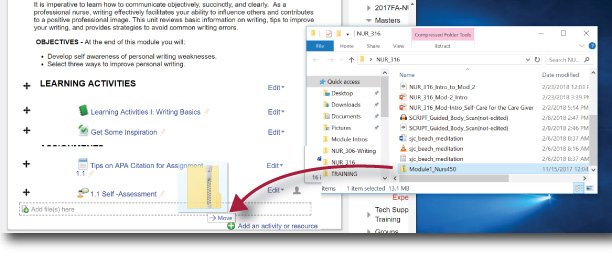8 Netiquette Tips
If you're interacting online with your professor and classmates or taking an online course, you should be aware of Netiquette! Netiquette is key to having fruitful online interactions. So what does it mean?
Netiquette is the correct or acceptable way for communicating on the Internet. Here at eight guidelines to follow in your online interactions:
Netiquette is the correct or acceptable way for communicating on the Internet. Here at eight guidelines to follow in your online interactions:
- BE RESPECTFUL & PROFESSIONAL
Be mindful of how you share your viewpoint. A negative disrespectful or flippant phrase may lead to further challenges as you try to solve the initial issue. - WORDS MATTER
Choose your words carefully so that they highlight your position and cannot be misconstrued as personal attacks.
When discussing controversial topics restate your peers’ opinion in order to demonstrate that you understand their point, and then state your opinion
If you feel that your peer’s off-topic or being negative privately contact your professor and/or lecture. personal issues should be addressed with them in a public online forum.
Think before you type… anger, sarcasm, all-caps are indicative of a negative tone. Avoid these in online communications, emails, and discussions. - EMAILS & DISCUSSIONS ARE NOT TEXTS
Steer clear of abbreviations and emoticons… they are not used in a professional environment. - CITE YOUR SOURCES
Do not plagiarize.
While few students consider copying from the web as serious cheating, you should know anything published on the web is considered an original expression of an idea which is protected by copyright laws.
Using online sources of text, images, video, or music—without citing the source—is a violation of the university code of conduct, and may result in disciplinary action by the administration. - USE TITLES:
when you're addressing your peers and instructor—for example dr. professor mr. miss—unless instructed to do otherwise.
‘Please’ and ‘Thank you’ should also be used. - BE ON TIME
When attending scheduled synchronous sessions or group meetings try to show up to the virtual meeting room—at least five minutes—early. This will give you time to setup your audio and video, and troubleshoot any technical difficulties you may encounter.
Being late for appointments and scheduled class time is unprofessional and it is disrespectful to your professors’ and peers’ time. - AVOID SHARING TOO MUCH
This is excellent advice in your courses, discussions, and social media settings.
NPR takes a look at some online post that yielded dire consequences - THE GOLDEN RULE
Do not do or say online but you do not do or say in person. The internet has a long memory; updates, images, comments, or posts that show you or your organization in a negative light could potentially harm you professionally.

